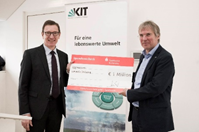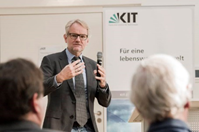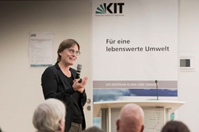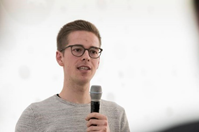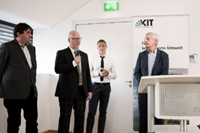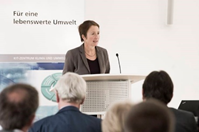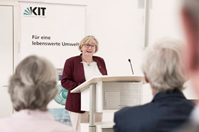Anniversary event of the KIT Center for Climate and Environment and presentation of the Sparkasse-Environment-Award 2018 on October 25, 2019
It was a big day and a big program for the KIT Center for Climate and Environment on October 25, 2019: Scientists from the former University of Karlsruhe and the former Research Center Karlsruhe have been conducting research together in the KIT Center for Climate and Environment for ten years. The cross-functional platform is an ideal place to discuss, research and develop technologies and strategies to meet the challenges posed by climate and environmental change.
The day began after the ceremonial introduction by a string quartet with the greetings of the President of the KIT Prof. Dr.-Ing. Holger Hanselka, by Theresia Bauer, Minister for Science, Research and Art Baden-Württemberg, and the environmental mayor of the city of Karlsruhe Bettina Lisbach.
Holger Hanselka emphasized the importance of researching climate and environmental change and explained where KIT has already contributed to this research topic and will continue to contribute. “We conduct research for social benefit and to preserve our livelihoods with a global perspective – and we have a long tradition in this,” said the President of KIT. Using examples, he explained how KIT positions itself on this issue and orients itself with its sustainability goals (e.g. hydrogen buses as bus shuttles between Campus North and Campus South). In this context, Hanselka announced that KIT would make its North Campus - where KIT is the developer - CO2-neutral by 2030.
In her welcoming speech, Theresia Bauer praised the young people who are taking to the streets today and, based on scientific facts, are demanding that they take a more decisive approach to climate change. There is no sign here that scientific facts are not believed; on the contrary, they explicitly refer to science and its results.
Bettina Lisbach emphasized that, from the city's perspective, the long-standing collaboration with KIT and the KIT Climate and Environment Center is an excellent starting point for future challenges, be it reducing the urban heat island or preserving the city of Karlsruhe's forests.
The four previous scientific speakers then briefly summarized the development of the KIT center. Over the past ten years, many closed meetings and discussions have laid a good foundation for successfully mastering the challenges and social demands caused by climate and environmental change.
As the first keynote speaker, Christian Serrer impressed with his refreshing and entertaining presentation. He described the creation of the bestseller “Small Gases – Big Effect,” which he self-published with a fellow student. The book on climate change and its causes is a bestseller and is currently being translated into several languages. A little surprised by their own success, both of them are now planning their next project, which will probably be shown in cinemas.
The second keynote speaker was Prof. Dr. Kerstin Stahl from the University of Freiburg. She spoke about drought in Germany - a consequence of change or change of consequences. It's probably a bit of both. In the time series and meteorological records you can definitely see an increase in long-term low water levels and droughts over the last 70 years. But compared to the drought of 1947, events occurring today also have different effects as a result of changed economic conditions and chains.
The conclusion of this program point was Dr. Axel Kleidon from the Max Planck Institute for Biogeochemistry in Jena. He spoke about the limits of wind energy use in the earth system context. Dr. Kleidon impressively explained critical interactions and the thermodynamic limits of wind energy use. The atmosphere is working hard but with little efficiency. Dr. Kleidon suggests other energy sources with higher efficiency, such as solar energy, as an alternative.
This was followed by the awarding of the Sparkasse Environmental Awards 2018, worth €15,000 and sponsored by the Sparkasse Karlsruhe Environmental Foundation. The environmental foundation turns 40 in 2019, another anniversary celebrated on this day. On this occasion, Michael Huber, Chairman of Sparkasse Karlsruhe, announced that the foundation's assets would be increased by €1 million. A big thank you to Sparkasse Karlsruhe, which has supported young scientists over the past 40 years, first at the University of Karlsruhe and, since 2010, at KIT.
The four award winners MSc Lukas Gerling, Dr. Matthias Budde, Dr. Julia Hackenbruch and Dr. Sven Killinger were happy about the honor and summarized in about five minutes what they worked on in their respective final theses.
The range of topics ranged from fine dust measurement using a smartphone app to urban heat islands and the simulation of PV performance to the future of the Fessenheim nuclear power plant.
The conclusion of the extensive but varied program was the highlights of the KIT center's research. Short lectures showed what experienced and aspiring scientists at KIT are dealing with. Methods of artificial intelligence in environmental research were reported on, as well as the analysis of weather conditions and flash floods, resource strategies, dealing with public opinion (Scientists for Future) and what KIT itself can do (e.g. B. KIT climate initiative).
Afterwards, with a snack and music, there was a long and lively conversation and discussion about various of the topics presented.
The KIT Center for Climate and Environment would like to thank everyone involved for holding the event, especially the Sparkasse Karlsruhe Environmental Foundation for the catering and the Sparkasse for the generous donation to the Environmental Foundation.
.jpg)
